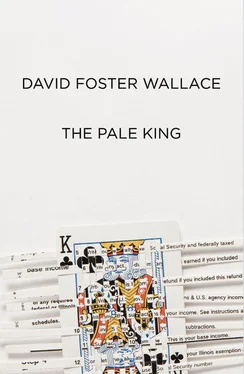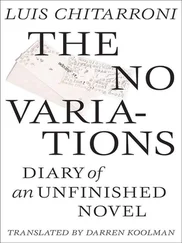David Wallace - The Pale King - An Unfinished Novel
Здесь есть возможность читать онлайн «David Wallace - The Pale King - An Unfinished Novel» весь текст электронной книги совершенно бесплатно (целиком полную версию без сокращений). В некоторых случаях можно слушать аудио, скачать через торрент в формате fb2 и присутствует краткое содержание. Год выпуска: 2011, Издательство: Little, Brown & Company, Жанр: Современная проза, на английском языке. Описание произведения, (предисловие) а так же отзывы посетителей доступны на портале библиотеки ЛибКат.
- Название:The Pale King: An Unfinished Novel
- Автор:
- Издательство:Little, Brown & Company
- Жанр:
- Год:2011
- ISBN:нет данных
- Рейтинг книги:3 / 5. Голосов: 1
-
Избранное:Добавить в избранное
- Отзывы:
-
Ваша оценка:
- 60
- 1
- 2
- 3
- 4
- 5
The Pale King: An Unfinished Novel: краткое содержание, описание и аннотация
Предлагаем к чтению аннотацию, описание, краткое содержание или предисловие (зависит от того, что написал сам автор книги «The Pale King: An Unfinished Novel»). Если вы не нашли необходимую информацию о книге — напишите в комментариях, мы постараемся отыскать её.
The Pale King
The Pale King: An Unfinished Novel — читать онлайн бесплатно полную книгу (весь текст) целиком
Ниже представлен текст книги, разбитый по страницам. Система сохранения места последней прочитанной страницы, позволяет с удобством читать онлайн бесплатно книгу «The Pale King: An Unfinished Novel», без необходимости каждый раз заново искать на чём Вы остановились. Поставьте закладку, и сможете в любой момент перейти на страницу, на которой закончили чтение.
Интервал:
Закладка:
‘In the bad old days, it was throughput.’
‘The average rote examiner could clear between twenty-seven and thirty files per day.’
‘Now it could be four, five files a day — if your Audit-to-Cost ratios are good, you’re in line for an outstanding six-month performance review.’
‘Of course, the more files you throughput each day, the wider a field of possibilities for high-ratio files you’re going to have, and the better your chances of filing 20s that realize substantial gains.’
‘But you don’t want to concentrate so hard on getting through as many files as possible that you fail to identify especially profitable returns.’
‘We prefer not to use the term “profitable,”’ the CTO said. ‘We prefer the term “noncompliant.”’
‘But a flamboyantly noncompliant return could be operating off such a low Line 23 that it’s actually more efficient to forbear on it but to 20 the return right next to it, which, while containing few errors or incongruities, actually realizes a far higher audit assessment.’
‘These are matters best left to your group orientation.’
Now actual drops of sweat were falling off the ends of Cusk’s hair, as an inaudible scream resounded inside him.
‘Right,’ the CTO said. ‘Let’s have a break and get you freshened up, and we’ll proceed with general criteria for Audit / No Audit decisions.’
There was going to be a break. David Cusk had not allowed himself to consider this. The lights would come up. Everyone would get up and leave at the same time. If he stayed, the beautiful girl behind him would see his sopped collar and the V-shaped darkening of sweat on his blue dress shirt, which it had been cocky and idiotic of him to wear instead of the more prudent and undarkenable white. He would sit there hunched over, pretending to study the M1 printout schema in his orientation packet, his core temperature well into three digits, drops of visible perspiration falling from the ends of his hair on all four sides to dot the packet, the arms of his shirt, the sizzling side of his nozzle lamp — there would be no way people could miss it. If he got up, though, and joined the crowds moving up the ramped aisles to the two exit doors, there would be no way people could fail to see what was happening with him, including the beautiful haughty French or maybe even Italian woman behind him. It was the nightmare scenario. Thinking this way was all but guaranteed to cause an attack, which was the absolute last thing in the world David Cusk wanted. He willed himself to raise his head. The hot spotlight he felt on him did not exist. The woman behind him was a person, had her own troubles, and wasn’t paying close attention to him — that was an illusion. The only thing that mattered about his head was that it was in her way, that she had to cross her thighs tight and sit way over to the side to see the podium and screen, where a split-slide shot of two desks wavered while the CTO tried to focus the projector with a handheld appliance connected to the projector by a cord that had gotten tangled around one of her legs.
Sylvanshine, before the morning of travel, had forgotten to wash the shampoo from his hair. It was this that gave him the flame-shaped coiffure.
David Wallace, meanwhile, was not enjoying any general orientation with slick slide show. Instead, he had been conducted (by someone who was not Ms. Neti-Neti) — with no opportunity to eat anything — to the REC Annex and a small room in which he and four other men, all GS-13s, listened to a presentation of the Minimum Tax on Preferences, which evidently had its origin in the Democratic administration of Lyndon Johnson in the 1960s. The room was small, stuffy, and had no whiteboard or A/V facilities. It did, though, smell strongly of Dry Erase Marker. All the other men in the room were conservatively dressed and hatted and very serious, with Treasury notebooks that came in zip-up leatherette folders with the IRS seal and motto embossed on the cover, which David Wallace had not received, and was taking notes in his private notebook folded over so that the IGA price tag in the upper-right corner was not visible.
The presentation was dust-dry and appeared to be very high-level and was made by someone dressed in a black suit and black vest over what appeared to be either a white turtleneck — which would have been bizarre in such hot weather — or one of those detachable Victorian starched collars that men used to put on and fastened with studs as the very final part of the Victorian dressing process. He was very clipped and impersonal and all-business. He seemed very severe and austere, with great black hollows in his cheeks and under his eyes. He looked a little like a popular representation of death.
‘We will note, however, that RA ’78 revised the expansionist tendencies of the ’76 provisions by removing both long-term capital gains deduction and excess itemized deductions from the index of relevant preferences.’ The term preferences had been used several times already. It goes without saying that David Wallace didn’t know what the term preferences meant, or that they were Congress’s clever way of reducing a certain income group’s tax burden without lowering its tax rate — one simply allowed special deductions or provisions that exempted certain portions of income from the taxable base, provisions collectively known in the Service as preferences. Later, thanks mainly to Chris Acquistipace, David Wallace would figure out that the MPT/AMT Group was tasked to enforce certain special provisions that the ’76 and ’80 acts had put in place to keep extremely wealthy individuals and S corps from paying, through the use of what are called ‘tax shelters,’ in effect, no tax at all. The Immersive Group to which David Wallace was assigned was part of the Immersive AT/S Pod (for Alternative Tax/Shelters). It would be embarrassing to state outright how long it took David Wallace to figure this out, even after several days of ostensibly examining files.
‘We note, however, that the ’78 act also added to the list of eligible preferences the excess of Intangible Drilling Cost deductions over any and all reported income from oil and gas production, effectively attacking the energy-based shelters of the mid-seventies oil shock, as in § 312(n) of the revised code.’ The way David Wallace was pretending to take notes was that he was simply copying down every last word or phrase the instructor uttered, much as he had for those college lecture classes in which he’d been hired to take notes for someone who was forced to miss class by a ski trip or extreme hangover. It was one reason why David Wallace’s left hand was way more muscled and substantial — especially the muscle between his thumb and forefinger, which bulged when the pencil was pressed to the paper — than his right. He could transcribe like the wind.
‘The provisions most relevant to your Memo 20 protocols are that ’78 increased the ATP tax rate to 15 percent and established the standard ATP exemption to the larger of (a) $30,000 or (b) 50 percent of the requisite tax due for the current year only, a provision which the Master Files render otiose but which the ’80 act’s provisions failed to address.’
One of the GS-13s raised his pen — not his hand, but just his pen with a small cool move of his wrist — and asked some kind of absurdly recondite question that David Wallace didn’t write down because he was flexing and unflexing his hand to ameliorate something that happened if he transcribed for more than a few minutes, which is that his left hand assumed a sort of automatic writerly claw shape and stayed that way after he finished transcribing, sometimes for more than an hour, forcing him to hide the hand in his pocket.
‘As of March of 1981, and subject to refinement in the case of fiduciaries and certain specialized industries such as if memory serves timber, sugar, and select legumes, the relevant provisions this group is required to examine for ATP computation are, excluding code sections except where immediately relevant, which sections you’ll find cross-indexed in your 1M specs 412, (1) Excess of accelerated depreciation on section 1250 property over straight-line depreciation. (2) Consequent to TRA ’69, excess of sixty-month amortization of certain items associated with pollution-control, child-care facilities, mining safety, and national historic sites over straight-line depreciation. (3) Excess of percentage depletion over a property’s adjusted basis at year’s end. (4) Bargain elements in qualified stock options — TRA ’76. (5) Excess IDC over fossil income as mentioned above.’ (David Wallace had no time to look above in his notes. He was trying to circle words and terms he didn’t know, figuring he could find a library. This list was not in his manual — they were given no manuals. It seemed expected that they’d already know this stuff. In order to deal with his feelings of confusion and fear, Wallace had opted to turn himself more or less into a transcription machine.) ‘(6) Being the excess of accelerated depreciation over straight-line depreciation on Section 1245 property leased to another.’
Читать дальшеИнтервал:
Закладка:
Похожие книги на «The Pale King: An Unfinished Novel»
Представляем Вашему вниманию похожие книги на «The Pale King: An Unfinished Novel» списком для выбора. Мы отобрали схожую по названию и смыслу литературу в надежде предоставить читателям больше вариантов отыскать новые, интересные, ещё непрочитанные произведения.
Обсуждение, отзывы о книге «The Pale King: An Unfinished Novel» и просто собственные мнения читателей. Оставьте ваши комментарии, напишите, что Вы думаете о произведении, его смысле или главных героях. Укажите что конкретно понравилось, а что нет, и почему Вы так считаете.












